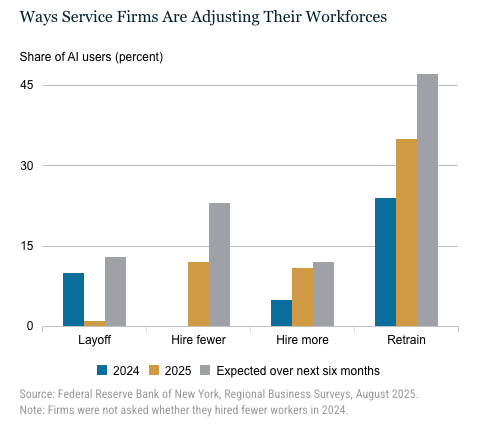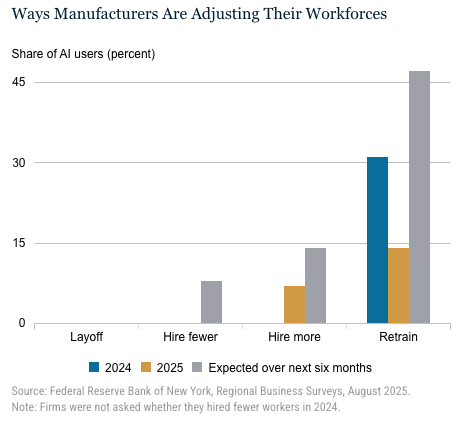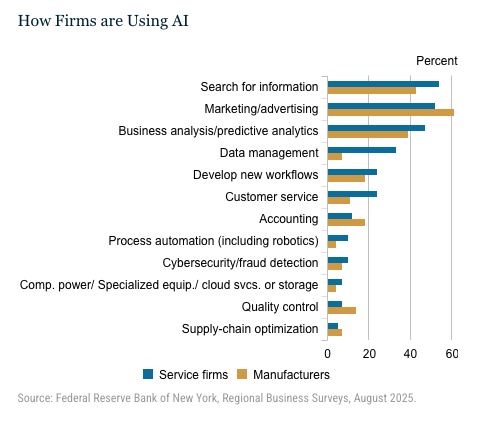-
Reading and Leadership
Great interview with Admiral James Stavridis, where they talk about his path, his connection to reading, and what he learned from Ernest Hemmingway’s The Old Man and the Sea.
Lots of good topics on things like leadership, grit, purpose, and the value of giving yourself to something
-
Over-Reliance on AI For Business Strategy
Are Businesses Scaling Back Hiring Due to AI? – Liberty Street Economics
The answer is not really, but AI usage is up among firms. As knowledge about the usage cases for AI improve, I think it’s likely that the areas that AI excels in will be disproportionately impacted. It’s interesting to see that most firms are expecting to retain workers and retain them



The biggest implication of how firms are using AI in my opinion is in the softer and harder to quantify areas of marketing and business analytics. The effectiveness of AI is subjective to the inputs that are given to it. And while AI certainly can assist those working in both fields, in my opinion the embodied human experience (with all its biases and heuristics) is a better medium with which to make these incredibly complex decisions.
-
David Hume and the Split Between Literature and Philosophy
How David Hume Split Literature from Philosophy – AEON
An interesting take on the split between the types of philosophical inquiries. I think often we overlook the value of literature and stories in teaching us, possibly because the authors of the media we consume are unconcerned with teaching or illustrating a specific point and more with entertaining. Literature can be a great source for teaching us how to live, even if we need the more analytical and general philosophy to reach our first principles.
Speaking of first principles, I think the same goes for learning how to be excellent in whatever field your in. You need general principles, but the principles don’t mean anything until you can translate them into action. For myself, as I’ve connected general principles I’ve learned with the stories of people I know or have read about, they become real, and I learn how to implement them in my own life.
-
Stratechery on Why the US Investment in Intel is a Good Idea
Coming from a non-technical background, I really don’t like the idea of the US government investing in intel. Thompson frames the decision differently, making the argument that for the sake of national security Intel needs to survive. It has a lot of problems and has been mismanaged and misdirected, but giving up on them won’t open the space for a new competitor to arrive. If anything, letting the market take its course would just relegate the US to chip (and therefore geopolitical) inferiority. I highly recommend reading this.
-
The Effect of AI on Entry Level Workers
Full Report from Stanford
WSJ Article
This feels a little concerning as someone who very soon will be looking for an entry level job, but the findings reinforce my view that projects and exploiting opportunities to gain experience are as important as classroom learning. -
How to Make Doing Hard Things Easier Than Scrolling Youtube
Video Link – Newel of Knowledge
Fairly interesting video about the psychology of doing hard things. He had a pretty interesting perspective on the maximum amount of dopamine our brains can produce. Opting for activities that produce dopamine quickly (unhealthy foods, tv, youtube, skimming articles, etc.) reduces our ability to do activities that produce slow dopamine (exercise, deep work, real connection, etc.).
-
What if AI doesn’t get much better than this?
https://calnewport.com/what-if-ai-doesnt-get-much-better-than-this/#more-16650
Cal Newport is a great writer, and his insights on to why AI coudl be plateauing for the time being are insightful. AI is good at being general, but it is crowdsourcing it’s knowledge, so until we figure out a way to teach AI to reason and judge whether the knowledge that it gets is true (i.e. until we figure out a new way to train AI) progress is likely to stagnate.
-
How to Use AI Deep Research
https://substack.com/@torstenw/p-160819332
An interesting read on best practices when dealing with AI research, treating AI more like a tool or an intern rather than a professional that implicitly knows everything. Learning how to develop good prompts is key to leveraging AI.
-
David Brooks on Audacity, AI, and the American Psyche
https://conversationswithtyler.com/episodes/david-brooks-2/
Super interesting read on the importance of literature, on what AI can and can’t do, and mentorship and career growth in journalism -
The Word Made LIfeless
Link to Article on the Hedgehog Review
This article gave a super interesting take on the dangers of AI and how even though it seems to be mastering words, it is mastering the wrong kind. The author delves into a discussion of the platonic idea of the “logos” and describes how the word in both ancient greek and biblical sources tends to point towards a practical and a teleological meaning. The practical meaning being that the logos can be used as rhetoric to reach an end, or we can use language to discover what the logos means.
Throughout the piece the author describes how the act of choosing words allows us to give meaning to our thoughts. In the struggle to find the right words, we determine what our thoughts actually are and come into contact with the truth. Outsourcing our word choice to AI robs us of this experience, giving us words with no meaning and no emotion. In effect, the purpose and feeling we get throuhg the Word is made lifeless.